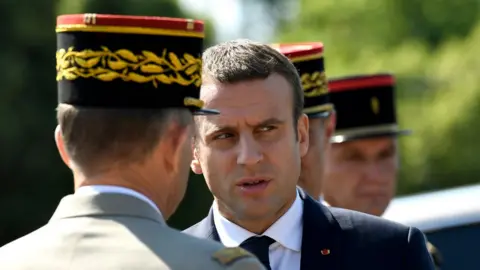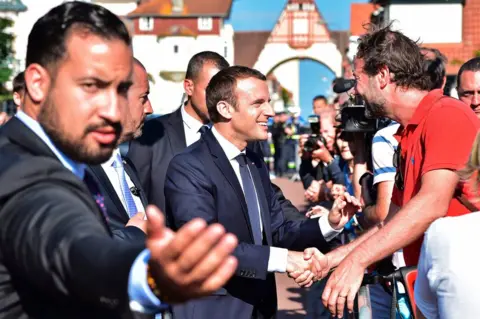Emmanuel Macron's conquest is complete - what now?
 EPA
EPASo the legislatives have been won, and the final part of what future history books will record as the Macronian conquest is complete.
In truth it has all happened so quickly - little more than a year from the germ of an idea to Elysian omnipotence - that the country feels slightly dazed.
People are looking at their new leader, and many more than voted for him are honestly impressed by his calibre. But many are also wondering: so where do we go from here?
For there is an unknown aspect to the coming mandate that sets it apart from all that went before.
Enigma
It is not just the newness of it all: the fact that President Macron's party didn't exist until he dreamed it up, and that half of the new parliamentarians will need lessons (literally) in how to do their jobs.
And that never before - at least not since Charles de Gaulle in 1958 - has a head of state had such a powerful majority, made up of men and women who depend on him so personally for their new careers.
And that the opposition has been reduced to a rump, thanks to the dégagiste (kick 'em out) imperative that wipes out sitting MPs in droves.
It is also that at heart Emmanuel Macron himself remains something of an enigma.
 EPA
EPAWhen he was 22, and already a precocious high-flier, the president spent several months as the amanuensis of one of France's then most respected philosophers, Paul Ricoeur.
The name will mean little to most people, but according to the experts, one of the key elements of Ricoeurian philosophy is the "ability to think at the same time two ideas that are apparently opposed".
For example - in a political context - that could mean supporting the freeing up of the labour market and protecting the most vulnerable. Or slimming down the state and ensuring that France's social contract remains intact.
The heart of the philosophy is a generous one: the recognition that neither side in an argument holds a monopoly of the truth, and that the best policies are ones that combine some elements of both.
Macron's adherence to this scheme of thought was most obvious in the pre-presidential debates, when his use of the phrase "au même temps" (at the same time) was much noted upon - implying as it did a constant bid to reconcile apparently contradictory ideas.
All this is very well - and his sincere desire to bring together left and right no doubt contributed greatly to his success.
But the enigma is this: when it comes to acting, rather than talking, which way will the president jump?
 AFP
AFPAfter all, the problems he will face in the coming months will be the classic ones that face all democratic leaders. Should I give way to demonstrators? Or should I use force to enact my manifesto? How do I balance the budget? Which is worse, a massive deficit or cuts in social spending?
Or on another current issue: should I give way to the human rights lobby and provide accommodation to the new Calais refugees? Or should I be hard-headed and turn them away, because housing them only encourages more?
On these and a host of other questions, no-one really knows the president's thinking.
He has promised to leave the old left and right behind, but maybe the old left and right don't want to go away. And maybe not everything is reconcilable by his magnificent Elysian fiat.
What we have seen so far is an object lesson in how to win power, carried out by a truly remarkable individual, who is half Machiavelli, and half Cary Grant. But that story is over now. Let the new story begin.
